30+/Cis-Woman/Bisexual/ Contains Adult ThemesFF.Net | AO3 | Blue Sky | Ko-Fi I follow back as @thatvixenisbloody
Don't wanna be here? Send us removal request.
Text
”But He Loved, He Should Have Been Forgiven”
About Free Will, Responsibility and Agency: Lucifer and Dream as Foils
Did I finally jump on the Lucidream/Dreamingstar bandwagon? No, don’t panic (or be eternally disappointed 🤣), because that quote is actually from “Murder Mysteries”, a short story that also exists in comic form (drawn by P. Craig Russell). And while it isn’t officially part of the Sandman Universe (or even DC), I always saw it as somewhat of a blueprint of how NG (re)imagined Lucifer’s Fall. There is enough in Lucifer’s characterisation in the Sandman that makes it quite plausible as a sort of backstory, especially since it was written when the Sandman was still in full swing. But more about that later…
I’ve long wanted to write a meta about Lucifer and Dream as narrative foils, and since I’ve finally started clearing out my drafts, this was a good one to do right now because we are currently discussing “A Hope in Hell” in our community (join us!). Although I have to admit that this one is rather about what transpires when Lucifer decides to abandon their realm in Season of Mists...
When Lucifer learns of Dream's impending return to Hell to finally release Nada, it solidifies their own resolve to leave (I use they/them pronouns because of the show although comics!Lucifer is male presenting apart from the plumbing and also referred to as he/him). By the time Dream arrives, Hell is nearly deserted, with Lucifer basically expelling its last inhabitants. Lucifer tells Dream they rebelled long ago, and that they are not willing to “pay for that one action” anymore. And the most profound truth they share with Dream is the nature of ultimate freedom—the freedom to leave. This is also brought up many issues later, when Lucifer says to Delirium, "I told him, you know. I told him years ago… I told him that I owed him much for having given me the impetus to go. I told him there was always freedom, even the ultimate freedom. The freedom to leave. You don't have to stay anywhere forever.”
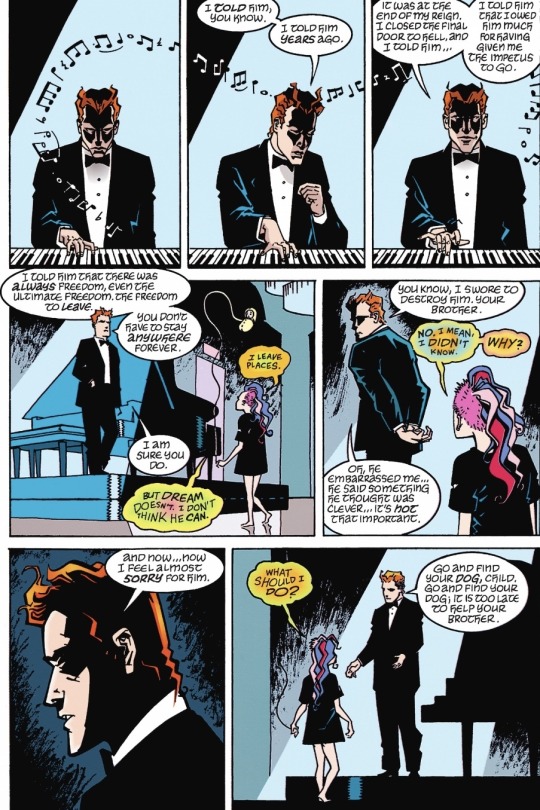
And that’s just… ouch. Not just because it so clearly shows that Morpheus also could have left had he just chosen to (then again, he wouldn’t be Morpheus if he had, and even more “then again”: he did in certain ways), but also because we generally see Lucifer as an antagonistic force. But here, they express something akin to gratefulness. And maybe even a hint of regret that Morpheus didn’t also choose the same way. They feel almost sorry for him (my guess is they actually do, and I can never forget their face at The Wake). But what do you do if even freedom feels like a cage?
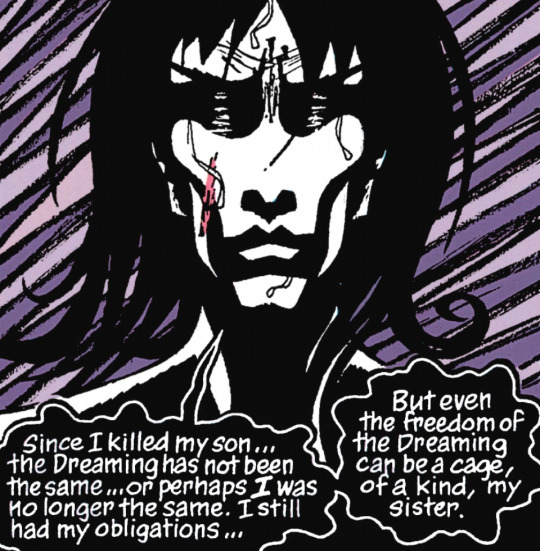
All of this ties in neatly with the crucial truth about Hell Lucifer reveals: People are there because they choose to be (and that Hell doesn’t need to be a physical place: We can make our own—any place, even in our own minds).
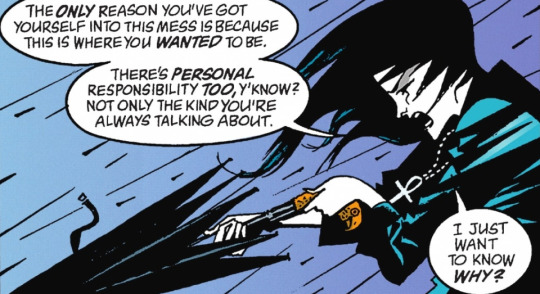
...this is where you wanted to be.
Lucifer explains to Dream:
"Why do they blame me for all their little failings? They use my name as if I spend my entire day sitting on their shoulders, forcing them to commit acts they would otherwise find repulsive. 'The Devil made me do it.' I have never made one of them do anything. Never. They live their own tiny lives. I do not live their lives for them.”
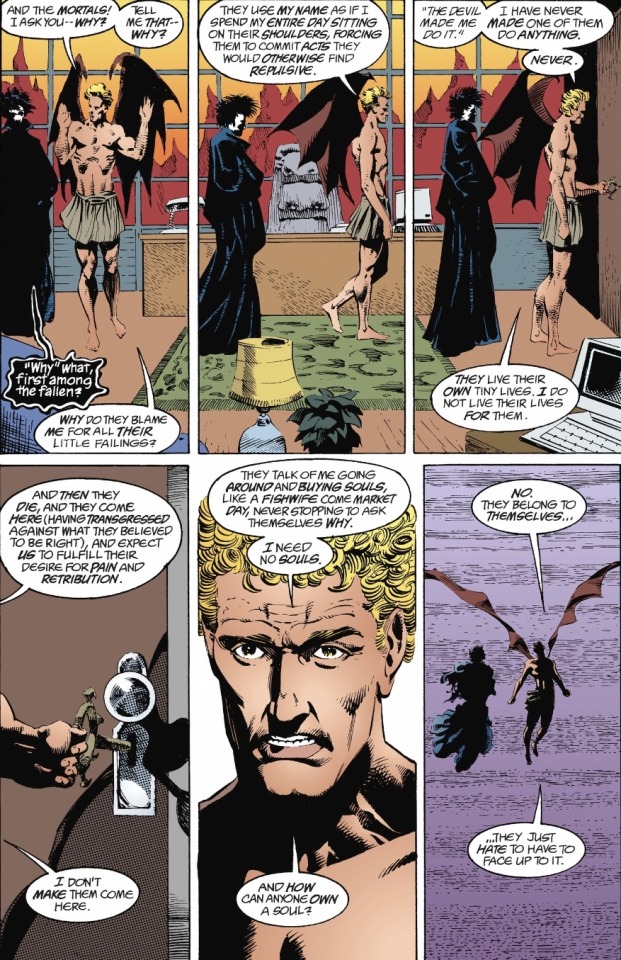
He continues, “and then they die, and they come here (having transgressed against what they believed to be right), and expect us to fulfil their desire for pain and retribution. I don't make them come here. They talk of me going around and buying souls, like a fishwife come market day, never stopping to ask themselves why. I need no souls. And how can anyone own a soul? No.
They belong to themselves… they just hate to face up to it.”
Which brings me to one of the most important messages (one of many) of the Sandman: People must take responsibility (and in this particular case not only for their lives but also for their afterlives, which is also a recurring theme). Each person's soul is their own, and no one can take that away. Paradoxically (or maybe not), as Lucifer abandons their own responsibilities, they urge people to take responsibility for themselves: You can drop said responsibilities, with all that entails, as long as you also take responsibility for the fallout.
So what about the wider question of free will then?
Let’s look at Lucifer's rebellion and fall for that, because both raise a lot of questions. Dream tells Lucifer that he remembers them as passionate, and Lucifer responds, “I cared about so many things. I suppose that was why everything began to go wrong. You know… I still wonder how much of it He planned. How much of it He knew in advance. I thought I was rebelling. I thought I was defying His rule. No… I was merely fulfilling another tiny segment of His great and powerful plan.”
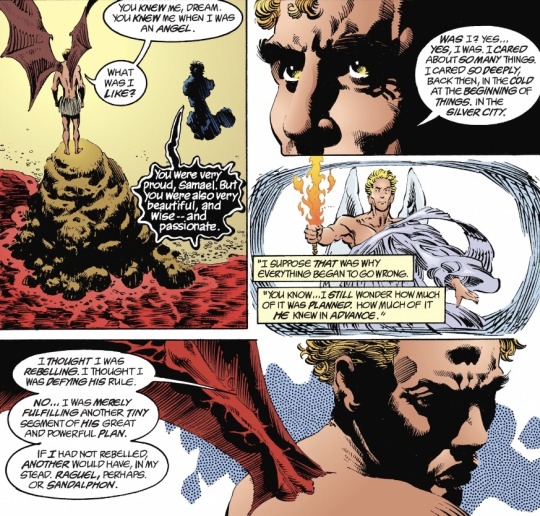
And this brings me right to NG’s short story “Murder Mysteries”, which isn’t really officially part of the Sandman Universe, but also… it totally is 🤣. In it, pre-fall Lucifer witnesses the destruction of an angel who killed another angel they loved. Raguel (the angel formerly tasked with said destruction who now walks on earth, coincidentally mentioned in the panel above as one who might also have rebelled) narrates, “‘That was not right. That was not just.’ Perhaps Saraquael was the first to love, but Lucifer was the first to shed tears."
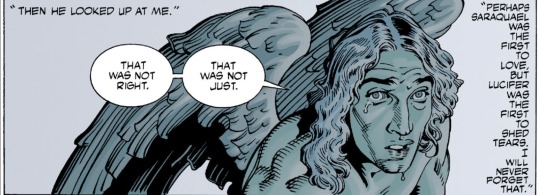
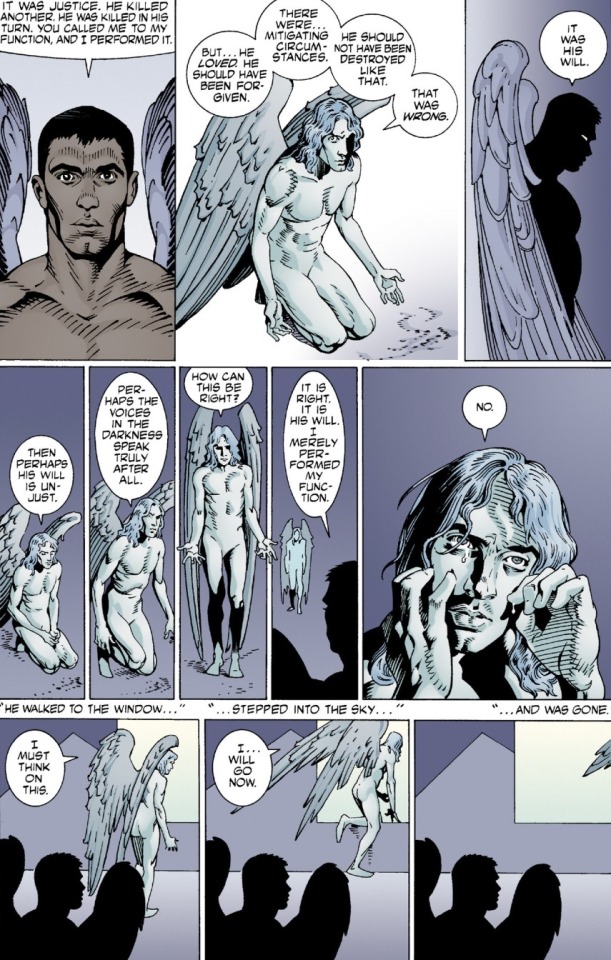
Later, it is revealed that God orchestrated this situation to push Lucifer towards rebellion. God needed an adversary to run Hell and says, “Lucifer must brood on the unfairness of Saraquael's destruction. And that—amongst other things—will precipitate him into certain actions. Poor sweet Lucifer. His way will be the hardest of all my children; for there is a part he must play in the drama that is to come, and it is a grand role.”
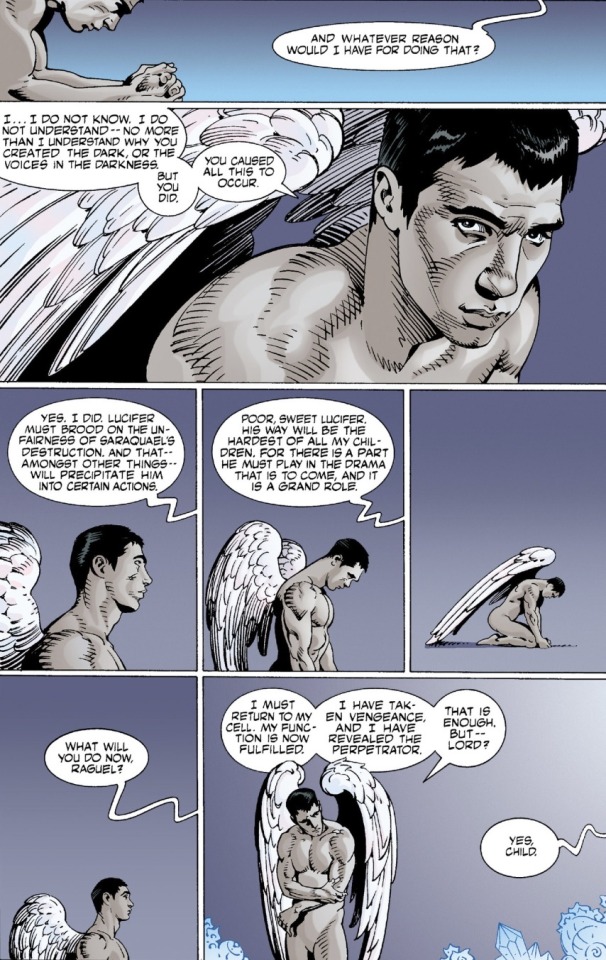
Lucifer was basically set up by God, and this somewhat revisionist interpretation of their rebellion and fall opens up larger questions about free will, agency and destiny.
Because although Lucifer's actions were influenced by God, they still carried them out and are therefore fully responsible for them. And by choosing to abandon Hell, Lucifer was taking responsibility for their own life. They faced a choice: remain in Hell as a shadow of their former self, or move on and make peace.
This fragile peace is illustrated at the end of "A Season of Mists," when Lucifer and an old man are conversing on a beach. The old man, despite having lost everyone he loved, remarks that any God who can create such beautiful sunsets couldn't be all bad. After the man leaves, Lucifer admits (basically to God), “He's got a point. The sunsets are bloody marvelous, you old bastard. Satisfied?”
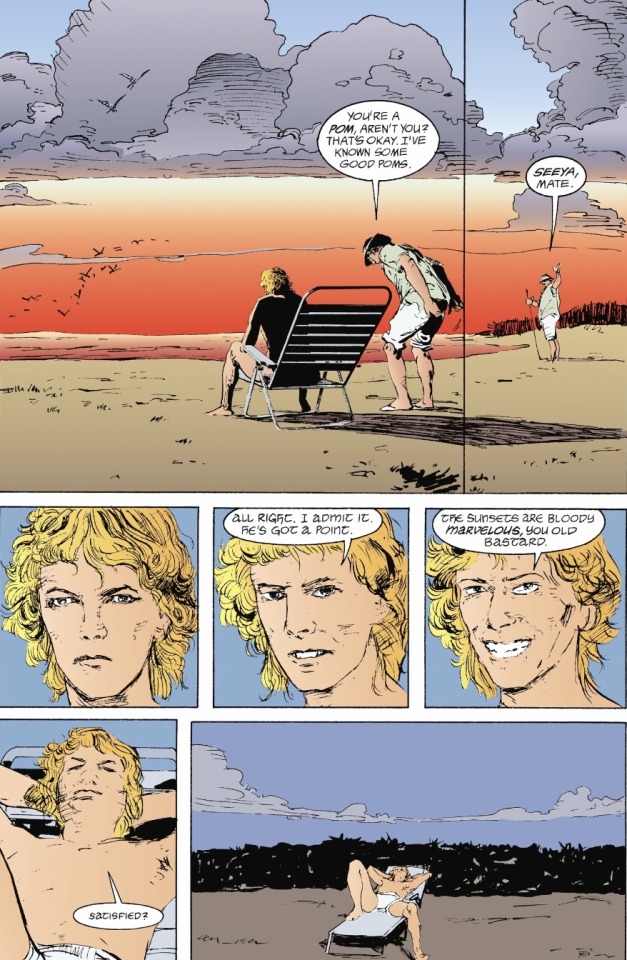
And in a way, even Lucifer comes to terms with their past once they take responsibility for it.
In a way, this mirrors Dream’s arc to a tee. One could certainly argue that he was set on his path by forces outwith his control: Whatever had to happen in cosmic terms was always bigger than Dream. The Fates also held a grudge against him and Orpheus, for more than one reason. Orpheus did make the Furies cry, and they never forgave him for that. Crucially though, he was also responsible for his own actions and carried them out. Only that Dream’s choice was ultimately a different one—or was it truly? Because what is the exact definition of “walking away”? He certainly did not abandon his realm like Lucifer because he ensured it was taken care of. There is no devil-may-care (no pun intended) attitude, because even when choosing death, Morpheus does care about his realm and the dreamers. Deeply.
It is the sole reason why the ending we get is the ending we get, and why we have Daniel as Dream in the end. And while Lucifer takes responsibility for their own life, Morpheus takes responsibility for his own death. But both Lucifer and Morpheus faced a choice: remain on their paths as shadows of their former selves, or move on and make peace. And both chose the latter.
And one takeaway for us, as the readers, might be that if we find ourselves in an intolerable situation, we can always walk away, even if the price may be high. This brings us back to the theme of freedom:
The price of freedom is taking responsibility for our lives, even if we haven't been fully in control of them. The freedom to walk away might not be the ultimate freedom, as Lucifer suggests, but it is significant.
Free will in the Sandman is a topic of debate, and I tangentially wrote about it before:
Destiny carries a book that contains everything that will happen to us, all there was, is and will be. Most of all though, it contains what must happen. One could say that in this universe, there is a strong element of predestination involved. However, complaining about a lack of free will and just pointing towards Destiny’s book also misses the point:
In the end, our lives are always our own (which is mentioned several times, directly or in a roundabout way: in Façade, in Song of Orpheus, in Brief Lives, in The Kindly Ones, in The Wake).
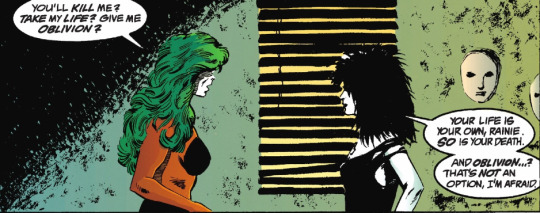
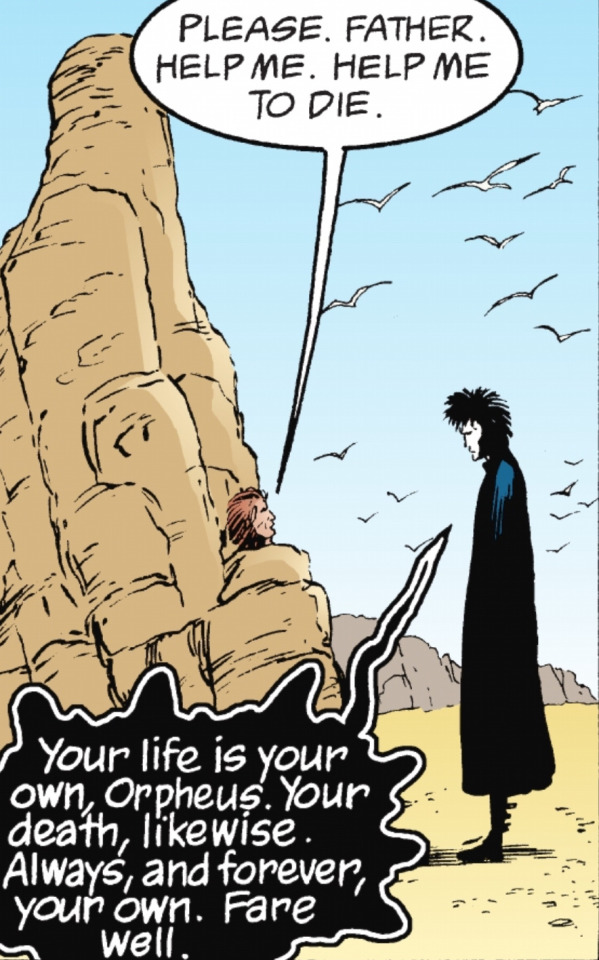

Your life and your death are your own
Some of us might have more to overcome than others, but the sooner we accept our unique challenges (which is not the same as being passive), the more we will focus on what we can change—or what we can meet with forgiveness and (self-)compassion.
Destiny and freedom as opposite sides of the coin matter far less than what we do with them…
80 notes
·
View notes
Text
Alright chaps, time to discuss, 'cause canon isn't quite clear on this one (or if it is, I was too dense to get it):
How is it explained that Lucifer is more powerful than Dream, when the Endless are above deities in the universal hierarchy, and Lucifer was created by a god?
Or is it less universal hierarchy related and more to do with the kind of power Lucifer wields (offensive? Destructive, arguably, although I like to see it more as productive power in the foucaulatian sense) vs that of Dream's (more passive? Defensive? Although we know he too is a warrior who fell gods).
What do y'all think?
86 notes
·
View notes
Text

King of All Night's Dreaming
Also a gift for @darthstitch
1K notes
·
View notes
Text

Dream and Nada—Vince Locke

The Kiss—Gustav Klimt
30 notes
·
View notes
Text
I feel we’re not talking enough about this panel…

Because yes, we always rant on about how much the fishbowl changed Dream, or that it was the onset of his change. And that’s also true. But…
The ruby was wrenched from his very being when he was young (he was still all white at that point, from what he wore to his hair. Just like Daniel). He took it from his chest. It was part of his essence (I’m sure we could find different words, like what we commonly call soul or heart in the literary/poetic sense, but of course it’s also about what he is, and about his function. Dreams and hopes. It was “powered by his spirit”). Most of the relevant info is linked here:
And then he gradually turns black, from hair to clothing (there’s still white in both in The Heart of a Star—by the end of it, it’s gone). And we wonder why he was often (not always) so cold and detached.
Then that essence gets released again, becomes a part of him again.
But it’s not just about power. It’s about gaining back his proverbial essence, his heart and soul and spirit, all that he is. Even if it hurts because there’s nothing now that keeps the pain and the constant teetering on the edge at bay that comes with feeling so deeply, and feeling everyone else so deeply (severing yourself from your essence, from your feelings, from all the dreams and hopes you have, also for yourself—isn’t that, at least to a degree, what humans do when they dissociate?).
But it also plays a part in him realising his wrongs and starting to set them right.
For billions of years, since he wrenched the ruby from his very being, he was basically incomplete because he denied himself what made him complete. He turned it into a tool, for whatever reason he believed made sense at the time. And then it all comes flooding back, and it’s just so much. Tools are indeed the subtlest of traps…
Yeah, thinking about that makes me a bit unwell…
314 notes
·
View notes
Text

Morpheus doodle that i wanted to do more with but my tablet keeps freezing on me :(
666 notes
·
View notes
Text
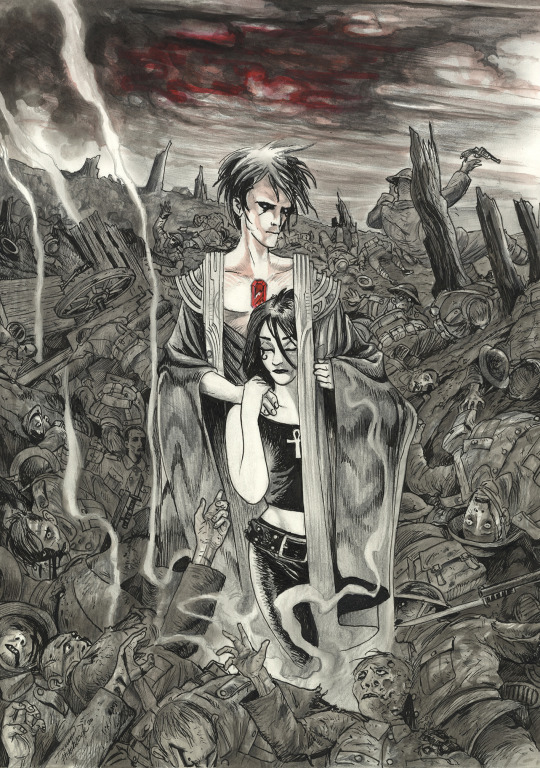
Dream and Death—David Hitchcock
All the Endless are buckling under the weight of their functions, not just Dream
This is so heavy in so many ways. Because yes, in your last moments, you might actually meet both Dream and Death. I find it strangely moving that they are portrayed as a team here to ease what can only be described as the most horrible suffering. Or maybe that’s just how I see it.
But it looks so heavy on her—so many stretching out their hands/reaching out for her, and we will never know whom she offers it to in the end (apart from the fact that she holds Dream’s hand 😬, which might be accidental or on purpose on Hitchcock’s part).
I personally think we actually see how heavy her function weighs on her here, and I sometimes find that vulnerability lacking in other portrayals. Dream looks almost protective in the way he wraps her up—she is allowed a moment, isn’t she?
But naturally, Death can also come to us shrouded in a Dream, which brings us full circle…
99 notes
·
View notes
Text

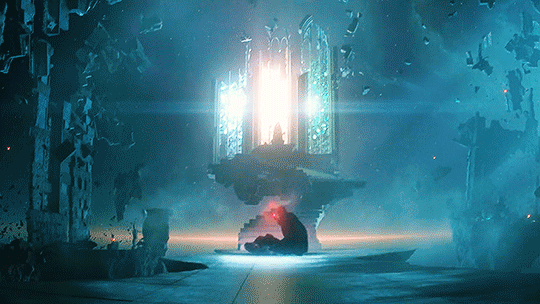


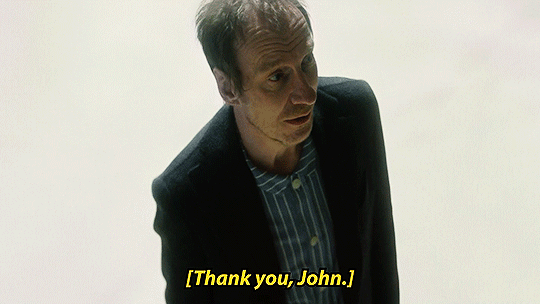


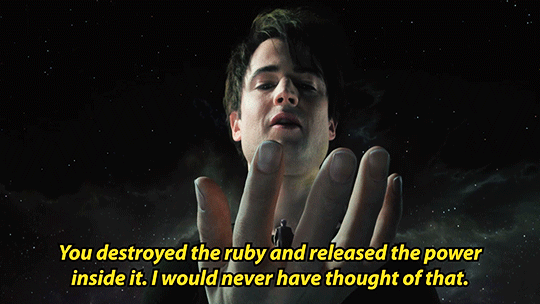
THE SANDMAN | Episode 1.05 "24/7"
670 notes
·
View notes
Text
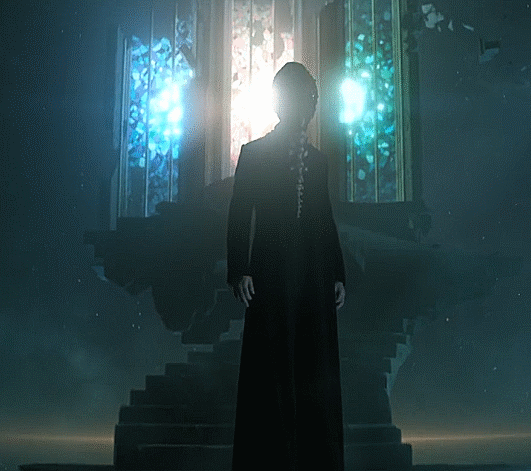




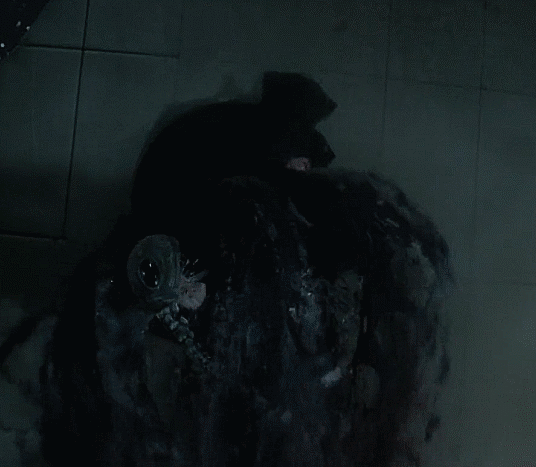



Your kingdom is my birthright
Dream of the Endless & Doctor Destiny Tom Sturridge + David Thewlis The Sandman 1.05 24/7
263 notes
·
View notes
Text




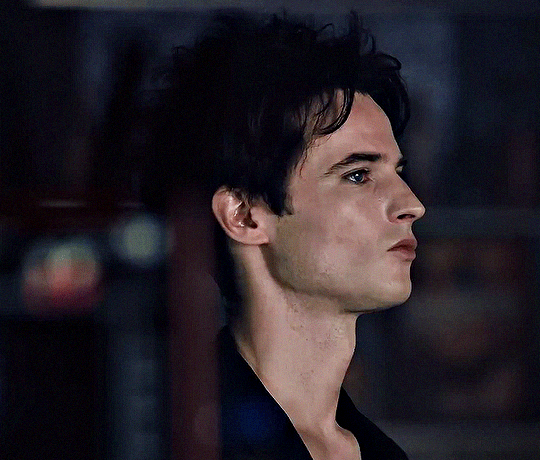

The Sandman: Season 2 | Behind the Scenes Sneak Peek
3K notes
·
View notes














